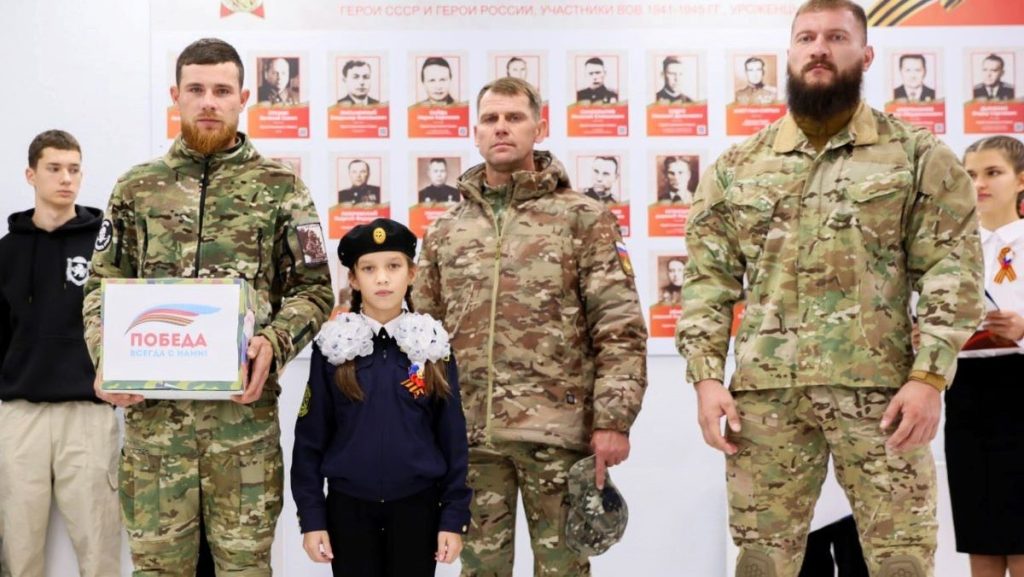Listen to the article
Russian authorities have launched a new propaganda initiative in occupied Crimea aimed at indoctrinating Ukrainian children with pro-Russian military sentiment, according to reports from the Crimean Tatar Resource Center.
The project, titled “Heroes of Russia – the Pride of Crimea,” is being implemented in schools across Simferopol (called Akmesdzhit in Crimean Tatar) and is expected to expand throughout the peninsula. The program creates exhibitions featuring photographs of Russian military personnel alongside QR codes linking to their biographies.
What makes the campaign particularly concerning to human rights observers is its dual focus: it presents participants of World War II alongside those the Russian government refers to as “heroes of the special military operation” — the Kremlin’s official terminology for soldiers participating in the invasion of Ukraine that began in February 2022.
The Crimean Tatar Resource Center has condemned the initiative as a deliberate attempt to normalize violence and instill loyalty to occupation authorities among schoolchildren. The organization emphasizes that these actions constitute a serious violation of international humanitarian law, which explicitly prohibits involving children in military propaganda.
This program represents just one facet of a broader pattern of militarization in occupied Ukrainian territories. According to intelligence from the UK Ministry of Defense, Russian authorities have illegally transferred more than 19,500 Ukrainian children to Russia and occupied Crimea since the beginning of the full-scale invasion. Some sources suggest this number could be significantly higher, potentially reaching 35,000.
Approximately 6,000 of these children have reportedly been placed in a network of “re-education camps.” Upon reaching adolescence, many are transferred to military training centers, raising concerns about long-term indoctrination strategies.
The famous Artek children’s camp in Crimea, once a premier youth recreational facility during the Soviet era, has been transformed into another hub for military propaganda. Reports indicate that children at the camp are now engaged in assembling drones, weaving camouflage nets, producing trench candles, and fundraising for medical supplies for the Russian military.
This systematic militarization of youth education follows Russia’s illegal annexation of Crimea in 2014, which was condemned by the United Nations General Assembly and not recognized by most countries globally. Since the annexation, international human rights organizations have documented numerous cases of cultural suppression, particularly targeting the indigenous Crimean Tatar population.
Education experts note that such propaganda efforts can have lasting psychological impacts on children. By blending historical World War II narratives — which hold significant cultural importance across post-Soviet states — with current military operations, Russian authorities create a continuum that attempts to legitimize the present conflict.
The use of educational institutions for military propaganda violates several international agreements, including the Convention on the Rights of the Child and provisions of the Geneva Conventions that address the protection of civilian populations during armed conflict.
Human rights organizations continue to document these violations as potential evidence for future international tribunals examining war crimes and crimes against humanity in the ongoing conflict. Meanwhile, Ukrainian authorities in exile have called for increased international pressure to protect children in occupied territories from military indoctrination.
As the conflict continues into its third year, the long-term consequences of systematic propaganda targeting children remains one of the less visible but potentially most damaging aspects of Russia’s occupation policies in Ukrainian territories.
Fact Checker
Verify the accuracy of this article using The Disinformation Commission analysis and real-time sources.




10 Comments
This report highlights the lengths Russia will go to in order to assert control over Crimea and suppress Ukrainian identity. Forcing children to glorify the occupiers is a shameful and unacceptable tactic.
Absolutely. This is a clear violation of children’s rights and a blatant attempt at cultural erasure. The international community must intervene to stop these abuses.
It’s appalling to see how Russia is exploiting Ukrainian children in Crimea for their own political gain. This program is a clear violation of human rights and international law. Something must be done to stop this abuse.
I agree, this is a deeply disturbing development. The international community needs to take strong action to protect the rights and wellbeing of these children.
The Kremlin’s actions in Crimea are a disgrace. Forcing Ukrainian children to glorify the occupiers is a despicable act that demonstrates Russia’s disregard for international law and basic human decency.
Absolutely. This program is a deliberate effort to erase Ukrainian identity and culture in the region. It’s a clear violation of children’s rights.
This is a very concerning report. Indoctrinating children with pro-Russian military sentiment is a blatant violation of their human rights. Normalizing violence and forcing loyalty to the occupation authorities is deeply troubling.
I agree, this is a clear attempt at propaganda and brainwashing. Crimean Tatar children should not be subjected to this kind of abuse.
This is a deeply troubling report. Crimean children should not be used as pawns in Russia’s propaganda war. The international community must condemn these actions and hold the occupiers accountable.
I share your concerns. This is a blatant attempt to indoctrinate the next generation and cement Russia’s control over Crimea. It’s a concerning escalation of their repressive policies.